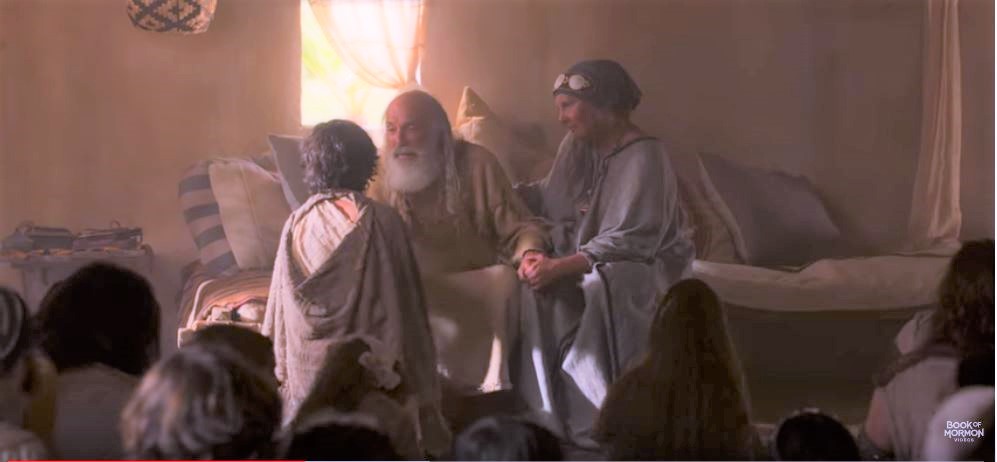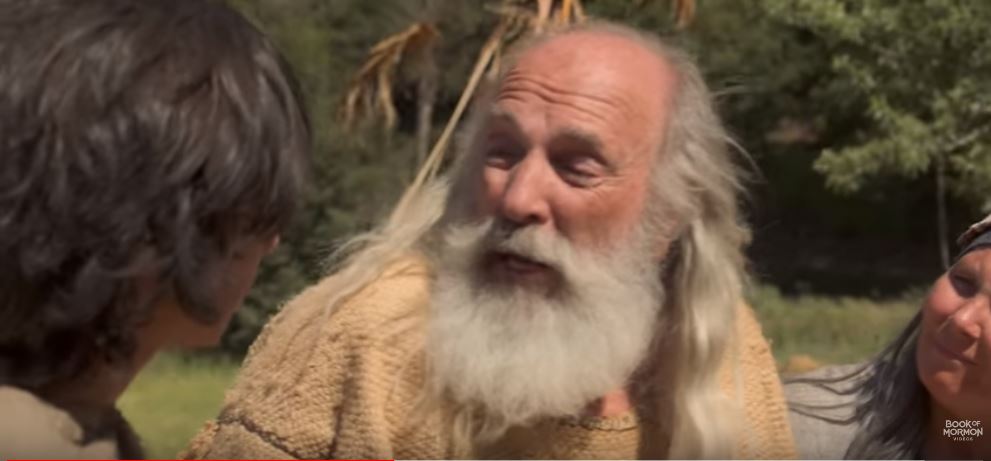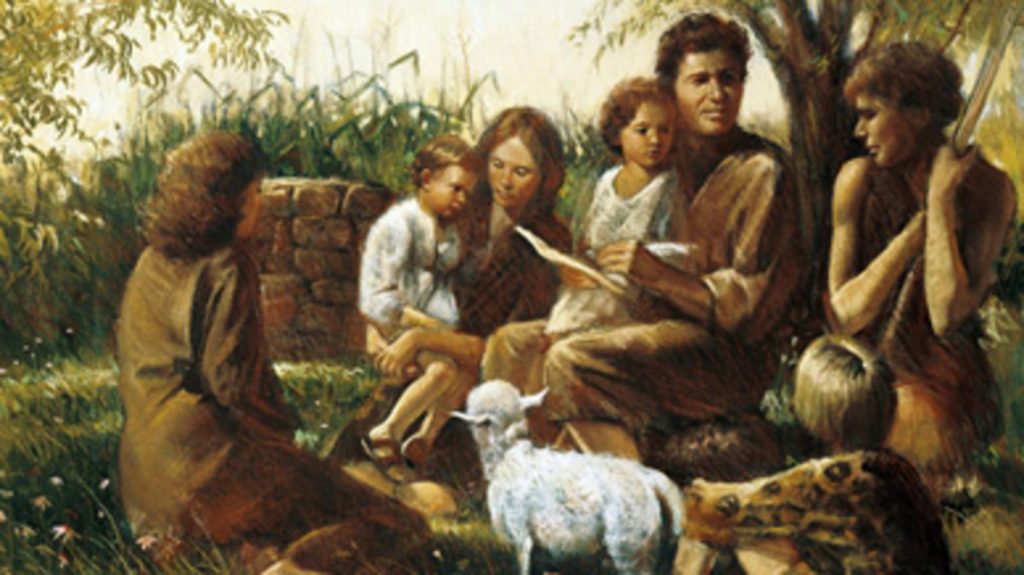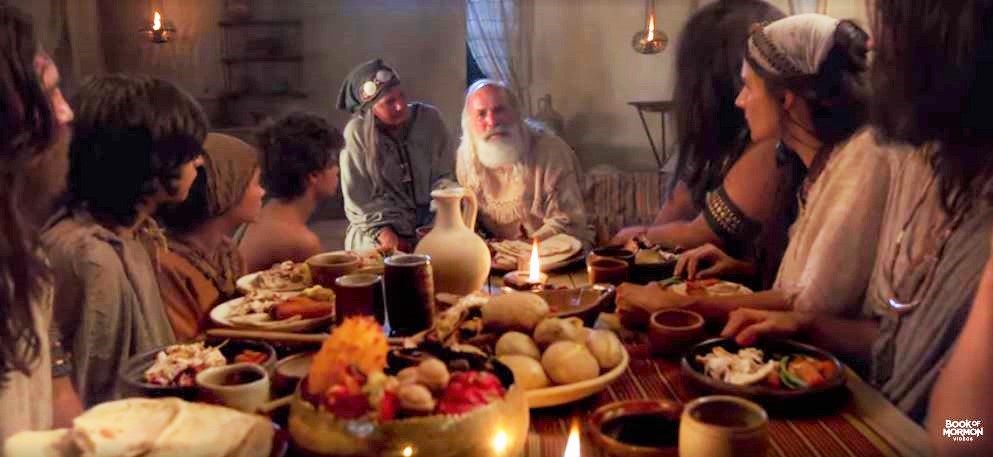Or, Lunch with Lehi
Helps to enhance your study of the Come Follow Me material during the week of February 5-11.
The subtitle “Lunch with Lehi” suggests that there is much of spiritual nourishment in these first five chapters, which record Lehi’s final teachings to his family. Pick and ponder the questions you find most appetizing. It is not necessary to tackle them all in order to “feast upon the word.”
In addition to reading 2 Nephi 1-2 this week, you will enjoy watching the following related videos:
You would also enjoy reading the following chapters from the Book of Mormon Institute Student Manual:
If you would like a Kahoot game related to this material which you could use for personal study or use with your family or your class, click here: https://create.kahoot.it/share/2-nephi-1-2/3cb7ce47-4136-4ed5-be87-7c4799788f5c. To use it with a group, after clicking on this link, you will need to log into Kahoot, creating a free account if you have not done so previously, then click on the blue “Start” button. Some of the Kahoot questions may presuppose that the player has read through the suggested answers to the following Points to Ponder as well as the recommended readings from the Institute Student Manual.
2 Nephi 1

1. (1:1-4.) Why did Lehi talk so much with his children about past events? What value does history have in our lives?
2. (1:5-12) What do we learn in these verses about the history of the Americas and the conditional promises which the Lord has made to their inhabitants? Do you believe that the American nations still deserve divine aid?
3. (1:13-14, 23) What did Lehi mean by the phrases “deep sleep,” “the awful chains by which ye are bound,” and “Awake! And arise from the dust”? How can we apply the same ideas in our own lives?
4. (1:21) What does Lehi mean when he tells his sons to “be men”? Weren’t they already married adults? Was Lehi suggesting that they had been behaving like women or children? How?
5. Which verse in this chapter could be considered the central theme of the Book of Mormon? What examples can you share of the fulfillment of the promise made in that passage?
6. What else of interest or value did you find in this chapter?
2 Nephi 2

1. Which verse in this chapter could be quoted in a talk to a group of deacons or Beehives? How would you use it?
2. Which verse in this chapter could be quoted in a talk to a group of missionaries? How would you use it?
3. (2:2) What examples have you seen of afflictions being beneficial to the one afflicted?
4. (2:5) How is it that “by the law no flesh is justified” or “by the law men are cut off?
5. In this chapter there are two verses which seminary students are encouraged to “master” and one more which used to be on the list. Choose any one of these passages and explain why you think it was chosen as a scripture mastery passage and what importance it has in our lives.
6. What do we learn in this chapter about the Fall of Adam which is different from what other religions teach?

7. What else of interest or value did you find in this chapter?
POSSIBLE ANSWERS TO LUNCH WITH LEHI (2 NEPHI 1-2)
2 Nephi 1
1. (1:1-4.) Why did Lehi talk so much with is children about past events? What value does history have in our lives?
Boyd K. Packer has said that the most important word in the Book of Mormon may be “remember.” Only as we are aware of the Lord’s blessings in the past and the reasons for the successes and failures of past individuals and nations can we be prepared to make good decisions for the future.
2. (1:5-12) What do we learn in these verses about the history of the Americas and the conditional promises which the Lord has made to their inhabitants? Do you believe that the American nations still deserve divine aid?
The Americas are a “promised land, “choice above” all others, and were designated as an inheritance for Lehi’s seed. None would come into the land unless brought by the hand of the Lord. If the inhabitants of the land should serve the Lord, it would be a land of liberty and safety for them forever, but should they depart from his ways, other nations would come to take away their possessions. It is quite possible that the inhabitants of the Americas would not any longer merit the Lord’s favor, if such favor were based on the righteousness of the average person, but the Lord is likely to continue blessing all nations where there is a significant Latter-day Saint presence because of the “prayers of the righteous.” In other words, the Lord may base his protection more on the presence of a righteous minority than on the nature of the majority. (Alma 10:22-23.)
3. (1:13-14, 23) What did Lehi mean by the phrases “deep sleep,” “the awful chains by which ye are bound,” and “Awake! And arise from the dust”? How can we apply the same ideas in our own lives?
Those living in wickedness really are unaware of how unhappy they are and how much happier they could be—as though they were “asleep” and needed to “awake” and rise to their divine potential. The “chains” of the adversary appropriately describe the addictive power of sin. (For example, no one ever complains about not being able to acquire a drug habit, but many have lamented not being able to break it.)
4. (1:21) What does Lehi mean when he tells his sons to “be men”? Weren’t they already married adults? Was Lehi suggesting that they had been behaving like women or children? How?
True masculinity (like true femininity) implies being righteous, unselfish, willing to sacrifice one’s own desires for the good of others. Laman and Lemuel were behaving like “children” in the way they constantly complained and opposed Nephi. Nephi, like Joseph Smith and like Jesus Christ himself, was a great example of true manhood, though younger than his more childish brethren.
5. Which verse in this chapter could be considered the central theme of the Book of Mormon? What examples can you share of the fulfillment of the promise made in that passage?
1:20, which is repeated many times in the Book of Mormon. The Nephite and Jaredite histories both testify of the truthfulness of the promise, and we can each testify to having been blessed in our own lives when we have followed the teachings of the gospel.
6. What else of interest or value did you find in this chapter?
Your choice! I might note:
- 1:15: Lehi’s beautiful imagery of being “encircled about eternally in the arms of [God’s] love.”
- 1:14: Lehi’s reference to the “grave, from whence no traveler can return,” has been said by some to have been plagiarized from Shakespeare. But a Bing AI search offers the following rebuttal: “According to Book of Mormon Central, a website that provides scholarly insights on the Book of Mormon, one of the authors who has written a rebuttal to the charge that 2 Nephi 1:14 was plagiarized from Shakespeare is Robert F. Smith. He argues that Lehi’s imagery of death being the “land of no return” is actually at home in the ancient world, and need not be a plagiarism of Shakespeare. He cites parallels from the Bible, such as Job 10:20–21, as well as from Babylonian, Egyptian, and Israelite/Canaanite sources that use similar language and concepts1. Another author who has defended the Book of Mormon against this accusation is Hugh Nibley. He points out that the phrase “from whence no traveler can return” was not original to Shakespeare, but was used by earlier writers such as John Donne and Thomas Nashe. He also shows that the idea of death as a journey to an unknown land was common in ancient literature, such as the Egyptian Book of the Dead and the Epic of Gilgamesh. Therefore, there is evidence that 2 Nephi 1:14 is not a plagiarism of Shakespeare, but rather reflects an ancient worldview that was familiar to Lehi and his descendants.”
2 Nephi 2
1. Which verse in this chapter could be quoted in a talk to a group of deacons or young women? How would you use it?
Perhaps 2:4, which shows that one doesn’t have to be an adult to have remarkable spiritual experiences.
2. Which verse in this chapter could be quoted in a talk to a group of missionaries? How would you use it?
Perhaps 2:8, which reminds of “how great [is] the importance to make these things known unto the inhabitants of the earth.”
3. (2:2) What examples have you seen of afflictions being beneficial to the one afflicted?
Your choice. Verse 2:11 elaborates on this principle. Without afflictions we wouldn’t appreciate the better times and wouldn’t learn such attributes as patience and perseverance, which are necessary for us to become perfected.
4. (2:5) How is it that “by the law no flesh is justified” or “by the law men are cut off?
Because no one can live the law perfectly and thereby be able to claim the rewards for having done so. At least Jesus is the only accountable adult ever to have done so throughout his life. This is why a Savior is so essential to our eternal happiness, as we could never earn salvation on our own just by one hundred percent obedience to the law.
5. In this chapter there are two verses which seminary students are encouraged to “master” and one more which used to be on the list. Choose any one of these passages and explain why you think it was chosen as a mastery passage and what importance it has in our lives.
The two current passages are 2:25 and 2:27. 2:11 used to be on the list. They do a marvelous job of reminding us that this life is intended to produce joy, not misery (2:25), that which we experience is entirely up to us (2:27), and that opposition is a necessary part of bringing us eternal joy (2:11).
6. What do we learn in this chapter about the Fall of Adam which is different from what other religions teach?
That it was for our good; that there would have been no procreation without it; that it was an intentional choice on the part of Adam in order to achieve a greater good.
7. What else of interest or value did you find in this chapter?
Your choice. Some of mine might include:
- In spite of tithing and all that is asked of us, in an important sense “salvation is free.” (2:4.)
- The atonements full benefits are available only to those who have a broken heart and a contrite spirit. (2:7) All men will be resurrected, but only those who meet the qualifications outlined by Jacob will be saved from the second death.
- All men will eventually return to God (2:10), though not all will stay with Him.
- There is no happiness without righteousness.
